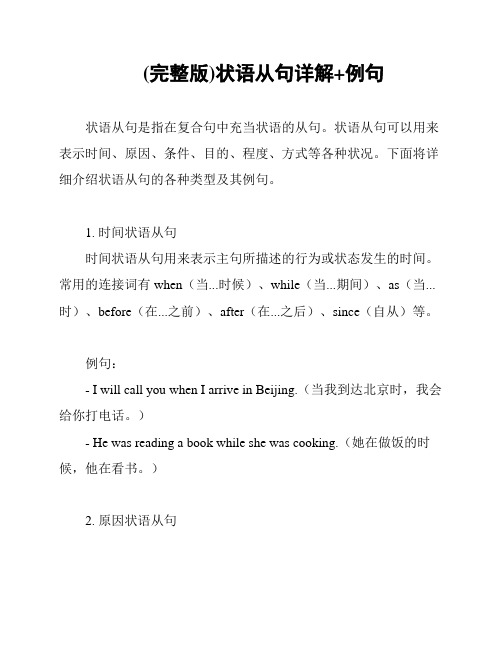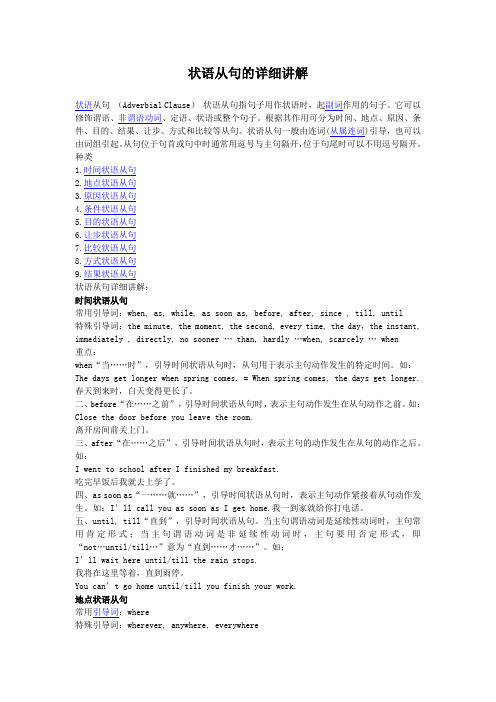状语从句(超详细讲解)
(完整版)状语从句的讲解最全的状语从句讲解

状语从句的讲解就是用一句话作状语分为:时间,地点,方式,原因,结果,条件,让步,目的,比较一、时间状语从句第一次见到你一见到你我就喜欢上了你直到见到你五岁时见到你When, as, while, before, after, since, till/until, as soon as no sooner…than…scarcely…when…hardly…when… the minute the second the instant the moment by the time 截止 immediately instantly directlyeach time every time next time the first time on doing sthwhenwhile 当…时as1。
when 1)当…时/ 延续性动词短暂性动词都可用2)这时/3)届时、到时I was watching TV when my cellphone suddenly rang这时When I was five years old I could speak five languagesThe wet weather will continue tommorow when a cold front is expected to arrive届时到时注意:时间状语从句中动作发生有前后时先发生的用过去完成时When my mother came back I had already gone to bed.2。
while 1)从句动词延续性2)同时发生3)对比的意味“然而”4)趁着He taught himself while he worked in a bank 延续性动词当他在银行上班时While we were working they were having a rest.对比While they were having a discussion , they got very confused。
(完整版)状语从句详解+例句

(完整版)状语从句详解+例句状语从句是指在复合句中充当状语的从句。
状语从句可以用来表示时间、原因、条件、目的、程度、方式等各种状况。
下面将详细介绍状语从句的各种类型及其例句。
1. 时间状语从句时间状语从句用来表示主句所描述的行为或状态发生的时间。
常用的连接词有when(当...时候)、while(当...期间)、as(当...时)、before(在...之前)、after(在...之后)、since(自从)等。
例句:- I will call you when I arrive in Beijing.(当我到达北京时,我会给你打电话。
)- He was reading a book while she was cooking.(她在做饭的时候,他在看书。
)2. 原因状语从句原因状语从句用来表示主句所描述的行为或状态的原因。
常用的连接词有because(因为)、since(因为)、as(由于)、for (因为)等。
例句:- I can't go to the party because I have to work.(我不能去参加派对,因为我得工作。
)- Since it is raining, we should stay at home.(由于下雨了,我们应该待在家里。
)3. 条件状语从句条件状语从句用来表示主句所描述的行为或状态的前提条件。
常用的连接词有if(如果)、unless(除非)、whether(无论)、provided(倘若)等。
例句:- If it rains tomorrow, we will stay indoors.(如果明天下雨,我们会呆在室内。
)- We can go shopping unless it is too late.(除非太晚,否则我们可以去购物。
)4. 目的状语从句目的状语从句用来表示主句所描述的行为或状态的目的。
常用的连接词有so that(以便)、in order that(为了)、lest(免得)等。
状语从句(完整版)ppt课件

状语从句(完整版)ppt 课件
REPORTING
目录
• 状语从句概述 • 时间状语从句 • 地点状语从句 • 原因状语从句 • 条件状语从句 • 目的状语从句 • 让步状语从句 • 结果状语从句
PART 01
状语从句概述
定义与作用
定义
状语从句是句子中充当状语成分的从 句,用于修饰主句中的动词、形容词、 副词或整个句子,表示时间、地点、 原因、条件、方式、让步等关系。
When I grow up, I want to be a teacher. (当我长大的时候,我想成 为一名老师。)
I was doing my homework when the phone rang. (电话响的 时候,我正在做作业。)
Once you start, you must finish it. (一旦你开始,就必须完成它。)
你想去的地方。
They searched for the lost child everywhere. 他们到处
寻找那个走失的孩子。
PART 04
原因状语从句
表示原因的连词
because
语气最强,表示直接的原因或理 由,可用于回答 why 提出的问 题、引导表语从句、用于强调句
等。
since
语气比 because 弱,但比 as 强, 一般用于表示“由于大家已知的 事实”。
虚拟语气
在条件状语从句中,可以 使用虚拟语气来表达与现 在或过去事实相反的情况。
条件状语从句的例句分析
01
02
03
04
05
If you study hard, you will pass the exam. (如 果你努力学习,你会通 过考试的。)
状语从句知识点详解(初中英语专项复习)14

状语从句知识点详解(初中英语专项复习)状语从句的概念: 用一个句子作状语来修饰动词和形容词,以表明动作发生或状态存在的时间、地点、原因等,这个句子就叫做状语从句。
状语从句的分类:状语从句共分为九大类,包括:时间、地点、原因、条件、让步、目的、结果、方式、比较状语从句。
下面分别讲解:一、时间状语从句概念:用来表示时间的状语从句,由when, while, as, till, until,before, after, since等引导。
由于时间状语从句的引导词所表示的意思并非一致,不同引导词表达不同的时间,它们在句子中对应的时态、语态等也有所不同。
例如:when /while引导的时间状语从句when引导的从句的谓语动词通常是瞬间动词,也可以是延续性动词。
从句动作可与主语动作通常先后发生也可同时发生。
I was writing when my sister came back.( come是瞬间动词,只能用when引导,不能用while)He often wrote me when/while he studied in Shanghai International Studies University.( study 是延续性动词,while可代替when)While my mother was cooking , I was playing chess with dad. (cook是延续性的动词,cook和play同时发生)I like playing chess while my sister likes reading stories.我喜欢下棋,而我姐姐喜欢看小说。
(while表示对比)when和while的区别还有:while引导的时间状语从句多用于进行时态,而when引导的时间状语从句多用于一般时态。
While we were playing games, our headmaster called me .我们正在做游戏的时候,校长叫我了。
状语从句的详细讲解

状语从句的详细讲解状语从句(Adverbial Clause)状语从句指句子用作状语时,起副词作用的句子。
它可以修饰谓语、非谓语动词、定语、状语或整个句子。
根据其作用可分为时间、地点、原因、条件、目的、结果、让步、方式和比较等从句。
状语从句一般由连词(从属连词)引导,也可以由词组引起。
从句位于句首或句中时通常用逗号与主句隔开,位于句尾时可以不用逗号隔开。
种类1.时间状语从句2.地点状语从句3.原因状语从句4.条件状语从句5.目的状语从句6.让步状语从句7.比较状语从句8.方式状语从句9.结果状语从句状语从句详细讲解:时间状语从句常用引导词:when, as, while, as soon as, before, after, since , till, until特殊引导词:the minute, the moment, the second, every time, the day,the instant, immediately , directly, no sooner … than, hardly …when, scarcely … when重点:when“当……时”,引导时间状语从句时,从句用于表示主句动作发生的特定时间。
如:The days get longer when spring comes. = When spring comes, the days get longer. 春天到来时,白天变得更长了。
二、before“在……之前”,引导时间状语从句时,表示主句动作发生在从句动作之前。
如:Close the door before you leave the room.离开房间前关上门。
三、after“在……之后”,引导时间状语从句时,表示主句的动作发生在从句的动作之后。
如:I went to school after I finished my breakfast.吃完早饭后我就去上学了。
状语从句知识点大总结

状语从句知识点大总结一、状语从句的定义状语从句是一个句子,它在句子中作状语,修饰主句中的动词、形容词、副词等,用以表示时间、条件、原因、目的、结果、比较等不同的状态。
状语从句通常由连词引导,常用的连词包括when, while, as, since, before, after, until, if, unless, although, though, as if, as though, so that, in order that, in case, even if等。
二、状语从句的分类1. 时间状语从句时间状语从句表示动作发生的时间,常用的引导词有when, while, as, before, after, since, until, as soon as等。
例如:- When I was young, I used to go swimming every day.- I will call you as soon as I arrive.2. 条件状语从句条件状语从句表示条件,常用的引导词有if, unless, provided that, as long as等。
例如:- If it rains tomorrow, we will stay at home.- I will go out unless it is raining.3. 原因状语从句原因状语从句表示原因,常用的引导词有because, since, as, for等。
例如:- Since it is raining, we can't go out.- I won't go to the party because I don't feel well.4. 目的状语从句目的状语从句表示目的,常用的引导词有so that, in order that, lest等。
例如:- I study hard so that I can get a good job.- We left early in order that we might avoid the traffic.5. 结果状语从句结果状语从句表示结果,常用的引导词有so...that, such...that等。
高中英语--状语从句专题讲解(详细)
注:
“no sooner…than…”,“hardly…when…”引导时间状语从句时,主句用过去完成时,从句用一般过去时。此外,当把no sooner, hardly/scarcely提到句首时,主句用部分倒装。
as意为“随着,一边…,一边…”,常有以下用法:
a)用于表示两个动作同时或者几乎同时发生。
b)表示两个发展变化中的情况。
c)表示在某事发生的过程中另外一件事发生。
d)表示随着短暂动作的发生,另一动作立刻发生。
before和after引导的时间状语从句
before意为“在…之前”,表示主句动作发生在从句动作之前。
=I hardly told him the news when he stopped listening.
地点状语从句
地点状语从句的引导词有when和wherever。
where, wherever指具体地点时,从句可用于主句之前或之后;
where, wherever表示抽象概念的含义时,从句需放在主句前。
When hehad finishedhis homework, hetooka short rest.(先发生+后发生)
When Igotto the airport, the guesthad left.(后发生+先发生)
注:
when还可表示原因,意为“既然”,引导原因状语从句;也可以用作并列连词,意为“就在那时”,常构成如下结构:
A number of high buildings have arisen where there was nothing a year ago but ruins.(where表示具体地点)
高中英语状语从句详细讲解及例句
高考英语状语从句练习与讲解状语从句在句中相当于副词做状语,又叫副词性从句。
状语从句分为时间状语从句、条件状语从句、地点状语从句、原因状语从句、目的状语从句、让步状语从句、结果状语从句和比较状语从句。
掌握状语从句应当引导词入手,注意引导词的词义,引导状语从句的引导词都有词思,所以,了解引导词的意思尤为重要。
引导词按意义分为九类:1)时间when , as , while , till , until , before, after , since2)地点where3)原因because , as , since , now that4)条件if , unless , once .so (as)long as . in case5)让步though , whatever (--ever) as, even though, even if6)目的so that, in order that7)结果so ... that8)比较than, as .. as9)方式as , as if1.I fell asleep when ( as , while ) he was doing his exercises .他正作练习时我睡着了。
(时间状语从句)2.When he arrived in Shanghai , his mother met him at the station .他到上海时,他妈妈到车站接他。
(时间状语从句)3.She always sings as she walks .她总是一边走一边唱。
(时间状语从句)4.I waited until he had finished his work .我等到他做完活。
(时间状语从句)5.It was not long before he told me about this affair .不久,他就告诉我这件事。
(时间状语从句)6.He has worked very hard since he entered the factory 自从他进厂,工作一直很努力。
状语从句的种类和用法详细分析
状语从句的种类和用法详细分析状语从句是英语语法中的一种从句,它在句子中充当状语的作用,用来修饰谓语动词或整个句子。
本文将详细介绍状语从句的种类和用法。
一、时间状语从句时间状语从句用来表示一个动作或事件发生的时间,它的引导词有:when, while, as, before, after, since等。
例如:1. When I arrived at the office, everyone had already left.2. After she finished her homework, she went to bed.二、原因状语从句原因状语从句用来表示一个动作或事件的原因,它的引导词有:because, since, as等。
例如:1. He couldn't attend the meeting because he was sick.2. Since it was raining heavily, we decided to stay at home.三、条件状语从句条件状语从句用来表示在特定条件下会发生的情况,它的引导词有:if, unless, provided that等。
例如:1. If it rains tomorrow, we will stay indoors.2. Unless you study hard, you won't pass the exam.四、方式状语从句方式状语从句用来表示一个动作或事件的方式,它的引导词有:as, like等。
例如:1. You should do it as I told you.2. He acted like he didn't care about anything.五、地点状语从句地点状语从句用来表示一个动作或事件的地点,它的引导词有:where, wherever等。
例如:1. I will go wherever you go.2. The children played in the park where their parents could watch them.六、目的状语从句目的状语从句用来表示一个动作或事件的目的,它的引导词有:so that, in order that等。
状语从句讲解经典
意思为既然或考虑到 (原因状语从句) It was foolish of you to take a taxi when you could easily walk there. How can they learn anything when they spend all their spare time watching television? Why do you want a new job when you have got such a good one? There is no point (in) owning a car when we have so good a public transport system. Why use metal when you can use plastic? How can he get the promotion when his boss dislikes him?
I will tell her about it when I see her. I was about to fall asleep when my sister came in. I will go home when he comes back.
I recognized the thief when/ as I passed him. When he finished his lecture, people stood up and applauded. I was walking on the street when I came across an old friend. We were about to set off when it began to rain. He had just finished the work when the doorbell rang. We were on the point of driving away when the policeman signed us to stop.
- 1、下载文档前请自行甄别文档内容的完整性,平台不提供额外的编辑、内容补充、找答案等附加服务。
- 2、"仅部分预览"的文档,不可在线预览部分如存在完整性等问题,可反馈申请退款(可完整预览的文档不适用该条件!)。
- 3、如文档侵犯您的权益,请联系客服反馈,我们会尽快为您处理(人工客服工作时间:9:00-18:30)。
状语从句引导状语从句的从属连词:(包括:时间,地点,原因,条件,让步,结果,目的,方式,比较等)1时间状语从句:A. *when: 从句可用1)非延续性动词,表点时间=at the time when…2)延续性动词,表段时间,此时可与while / as互换。
注:a)从句中的动作既可与主句动作同时发生b)也可在主句动作之前或之后发生。
后者不可与while/as 两者换用。
.When I got home, he was having supper. b).When(=Before) I got to the party , some guests had left.When(=After)he finished his work, he took a short rest.3)也可做并列连词,“这时”be about to do/ be going to do/ be doing… when…had hardly/just/scarcely/not done…when…*while:1)“在…期间”;从句只能用延续性动词,表段时间=during the time when...2)当“趁着”讲。
3) “尽管” = althougheg.____ I admit that the problems are difficult, I don’t agree that they can’t be solved.A. WhileB. WhenC. AsD. Because3)也可做并列连词,表对比关系,“而”。
*as: 1)“随着”,指动作的进程(with也有“随着”之意,但是介词,只跟短语。
)“一边```一边```”,强调主从句谓动的同时发生。
1._______________he was in Beijing, he made a lot of friends.--->When /While in Beijing,…2._______________he was studying in Beijing, he made a lot of friends.--->When /While studying in Beijing,…--->During the time when he was( studying) in Beijing,…3.______he arrived in Beijing, he received a warm welcome.--->At the time(when )he arrived in Beijing,…/At the time of his arrival, …4. _____ time goes on, the situation is getting worse and worse.5. The atmosphere gets thinner and thinner______ the height increases. (从句)--->with the increase of the height. (短语)6. The students took notes ______they listened./ He hurried home, looking behind _____ he went.7. Strike __________the iron is white-hot. 趁热打铁。
8. Come and pay a visit to the park_______ all the flowers are in blossom. 趁着花还开着,去公园玩一趟吧。
9. I had hardly / scarcely closed my eyes ________ someone knocked at the door.-->I had no sooner closed my eyes ________ ……10. The Chinese prefers drinking tea ___________ Americans like drinking coffee.B. before/after:1.She had studied Russian for three years ________she was sent to the Soviet Union.---> ________being sent to the Soviet Union.21).It won’t be long ________ we meet again.2). They hadn’t known each other long ________ they got married.3. It seemed only seconds ______ the boy finished washing his face. 4)we hadn’t waited long ____the bus came.5). How time flies! Two and a half years have passed _______ we know it.以上的before一律译成“就”3. I’m afraid it will be 3 years ______ we meet again. 2). I must finish the composition _____ I go home.此处译为“才”4. __________ it was made into a movie, the novel became even more popular.-->_________ being made into a movie, …-->_________been made into a movie, …5. Three billion years _________ life began, the earth is now the home to many different kinds of living things.6. Karaoke was spread to the whole world shortly / soon ________ it was invented.C. as soon as /oncethe moment / the instant / the minuteimmediately /instantly /directly1). The moment I saw him, I knew he was a warm-hearted man.2). As soon as the film star appeared on the stage, there arose a wild slap.3). The moment he entered the room, he fixed the chain across the door.---> ______ entering the room, he…4). Immediately she heard the noise, she rushed into the room.---> ______ hearing the noise ,she …D. till / until1).I knew nothing about it _______/_______ he told me. BUT:__________ he told me, I knew nothing about it.2).She stood (延续性动词用肯定式) there _____ they had passed out of sight. 她一直站到他们从视野中消失了为止。
3).She didn’t leave/ go away (非延续性动词用否定式)there_______ they had passed …她直到他们看不见了才离开。
几组延续/ not+非延续性动词的比较:wait / not leave stay here /not go away sit/not stand up lie/ not get up stand/ not sit work / not stop working go on working/ not finish4).Until we have thought it over , we’ll take ______ steps. A. no B. any C. some D. all5)将3)改成强调句式:改成倒装句式:6).---When will the concert begin? ---__________.A. Till 7:30 B. Not until 7:30 C. Not after 7:30 D. From 7:30[]在强调结构中或与not连用时,多用until.[][] 时间状语从句可以缩略,常见形式:1. Don’t speak until _________(speak) to.2. Once _______ (see ),it can never be forgotten.3. He was a swimmer when a child /as a child.4. Relax yourself whenever possible.5. He often makes mistakes when ___________(speak) English. []分词代替从句时,主从句的主语必须一致。
6. He failed to express himself when ____________(introduce) to the girl.E. since:自从```以来从句多用一般过去时,主句多用完成式或完成进行式;但若表达“时间过了多久”则用“It is + 时间段”。
Much change has taken place_______ the Gang of Four was knocked down.It is over 75 years _________ the Long March ended in victory in 1935.1).-What was the party like? -- Wonderful. It’s years _______ I enjoyed myself so much last time.A. afterB. whenC. beforeD. since2)---How long has the bank been in business? ---_________ 1987. A. After B. In C. From D. Since3)_________ have you known him? A. Since how long B. Since when C. Since long ago D. Since when was it(答案:B. Since when = Since how long ago。
